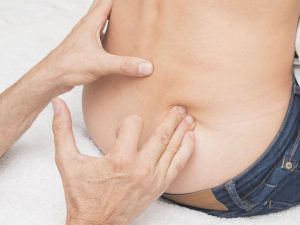Coccyx pain management, osteo & physio treatment for tailbone pain (coccydynia) after injury, fall or during pregnancy with our specialised physiotherapist & osteopath, in London at our practices in East London Moorgate Monument EC3, Belgravia Westminster SW1 and Clapham SW4 or at your home in London.
Our physiotherapists & osteopaths in London are specialised in rehabilitation & treatment for tailbone pain (coccydinia or coccygodinya) or dislocated coccyx.

Because of pregnancy and the ligaments around the coccyx loosening up to make room for the growing baby, tailbone pain happens more often in women than in men.
Due of its location, people suffering from tailbone pain will tend to be limited in their movement as sitting, changing position and getting up can increase the pain.
Tailbone pain, coccyx pain, discolated tailbone treatment with physiotherapy and osteopathy in London
At Mummy’s Physio in London, our women’s health physiotherapists are experts in conditions such as coccyx pain during pregnancy and childbirth, or following an injury. With the best trainings and many years of experience, they will provide the most efficient techniques to release tailbone pain and treat tailbone injuries, whether it is or not related to pregnancy.
If you are an Axa or Bupa patient, you cannot book online. Please call our office with your authorisation number.
If you cannot find an appointment that suits you, call us or send us a message: we will do our best to find you a slot.
Recover from coccyx pain, tailbone pain and injury with osteopathy and physiotherapy coccydynia & coccygodinya in London, in London at our practices in East London Moorgate Monument EC3, Belgravia Westminster SW1 and Clapham SW4 or at your home in London
Our team of highly trained physiotherapists & osteopaths provide treatments at our practices in London:
- Light Centre Belgravia near Victoria Station: 9 Eccleston Street, SW1W 9LX
- Light Centre Monument near London Bridge & Bank: 114 London Wall, EC2M 5QA
- Make Me Feel Pharmacy Clapham between Clapham South & Clapham Common: 25 Abbeville Road, SW4 9LA
- Light Centre Clapham near Clapham Common Station: 151-153 Clapham High Street, SW4 7SS
However, if you prefer being treated in the intimacy and the comfort of your own home, our physio & osteo can come treat your coccyx pain at your place, in London.
Our physiotherapy and osteopathy treatments are covered by most health insurances and are Bupa registered & recognised (BUPA Global and BUPA UK), Axa registered & recognised (AXA International, AXA PPP), Cigna registered & recognised and WPA registered & recognised
For tailbone pain treatment with physio or osteo in London, at the clinics or your home: 0207 125 0262 / 0782 455 3765
More information about tailbone treatment and coccyx pain management in London, dislocated coccyx and tailbone pain during pregnancy
What are the symptoms of tailbone (coccyx) pain?
Coccyx pain, also known as tailbone pain or coccydynia, is a pain that occurs in or around the bony structure at the bottom of the spine (coccyx), just above the buttock.
The pain is usually chronic and dull, but you might experience occasional sharp pain. It also gets worse when you are sitting down or moving from sitting to standing, as well as when you keep standing for a long period. Pain can also increase during sexual intercourses or defecation. Coccyx pain limits certain activity that requires movements, like driving or bending over for example.
What causes tailbone pain?
Tailbone, or coccyx pain, can be caused by:
- A trauma: during a fall, a prolonged sitting or poor posture
- Pregnancy: the baby growing as well as hormones will cause the stretching and relaxation of the pelvic floor, which will move the coccyx and create sometimes pain in the area
- Vaginal childbirth
- Overuse and repetitive movements in sports as cycling or rowing, due to continually leaning forward and stretching the base of your spine
How can physiotherapy and osteopathy help treat tailbone pain?
Different methods can be used:
- Mobilisation: can be external or internal. The osteopath or physiotherapist will always try external manipulation in the first place. If this one isn’t enough for the patient, there is possibility to discuss and try internal mobilisation. The external mobilisation consists in local mobilisation of the coccyx (tailbone) and the sacrum and is usually not too painful. The internal manipulation (done with appropriate tools) is firstly approved by the patient who will be requested to fill a consent form. Following that and after failure of external mobilisation, internal mobilisation can be done. This latest can be quite painful sometimes according to the initial pain already present.
- Soft tissue manipulation: alongside dysfunctions of the coccyx, muscles and ligament surrounding the pelvis can also be the cause or maintain the coccyx in a wrong position. Thanks to the releasing techniques on these muscles (glutes, pyriformis etc.) soft tissue manipulation can help release the coccyx and relieve the pain.
- Stretches and exercises: physiotherapy exercises and in particular breathing and pelvic floor exercises will be greatly beneficial in taking pressure off the coccyx and release the pain
If you are an Axa or Bupa patient, you cannot book online. Please call our office with your authorisation number.
If you cannot find an appointment that suits you, call us or send us a message: we will do our best to find you a slot.




